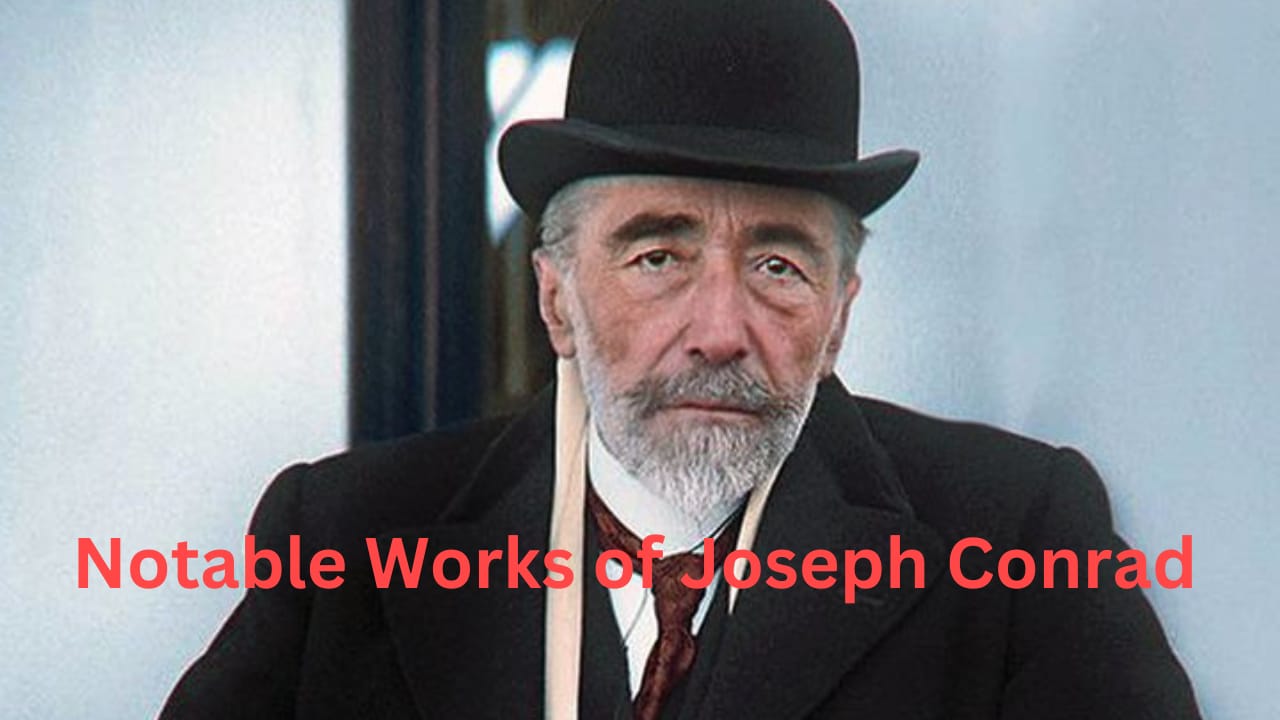Joseph Conrad :
Joseph Conrad, born Józef Teodor Konrad Korzeniowski in 1857, stands as one of the most influential figures in English literature. His life, marked by adventures at sea and a deep exploration of the human psyche, profoundly shaped his literary endeavors. Conrad’s works are renowned for their exploration of complex themes such as morality, imperialism, and the existential struggle of the individual.
Harold Bloom says,
“Conrad is one of those writers who reveals to us strikingly and convincingly the complexity of human motivation.”
As critic F.R. Leavis observed, Conrad’s works possess a “peculiar imaginative richness” that sets them apart from the works of his contemporaries, allowing readers to experience the world through the eyes of his characters in all its complexity and ambiguity.

Works of Joseph Conrad:
On a voyage through the captivating works of Joseph Conrad, exploring the timeless themes and enduring truths that continue to resonate with readers around the world.
“Heart of Darkness” (1899):
This novella follows Charles Marlow, a sailor, on his journey into the Congo Free State in Africa. Marlow recounts his experiences with a group of sailors, describing his search for the ivory trader Kurtz, who has become consumed by the darkness of the jungle and the power he holds over the indigenous people. Through Marlow’s narration, Conrad explores themes of imperialism, colonialism, and the darkness within the human soul.
“Lord Jim” (1900):
The novel centers on Jim, a young British seaman who faces a crisis of conscience after abandoning a sinking ship full of pilgrims. Tormented by guilt, Jim seeks redemption by living an honorable life, but his past continues to haunt him. The narrative delves into themes of honor, guilt, and the search for identity, as Jim navigates the complexities of human morality.
“Nostromo” (1904):
Set in the fictional South American country of Costaguana, “Nostromo” revolves around the lives of various characters caught up in political upheaval and corruption. The story focuses on the eponymous Nostromo, a trusted and respected dockworker who becomes embroiled in a conspiracy involving a silver mine. Conrad explores themes of greed, ambition, and the effects of colonialism on indigenous populations.
“The Secret Agent” (1907):
This novel is set in London and follows Adolf Verloc, a spy who becomes involved in a plot to detonate a bomb. As the story unfolds, Conrad explores themes of terrorism, political intrigue, and the fragility of modern society. Through the character of Verloc and his associates, Conrad examines the motivations behind acts of violence and the consequences of political extremism.
“Typhoon” (1902):
This novella tells the story of Captain MacWhirr and his crew as they navigate a powerful typhoon in the South China Sea. As the storm rages on, the crew must confront their fears and rely on their captain’s steadfastness to survive. Through vivid descriptions of the storm and its effects on the crew, Conrad explores themes of nature’s power, human resilience, and the dynamics of leadership.
Themes in Joseph Conrad’s works:
Joseph Conrad’s works are rich with themes that explore the complexities of the human condition and the challenges of existence. Some of the prominent themes found throughout his writing include:
Colonialism and Imperialism:
Conrad frequently examines the impact of European colonialism and imperialism on both colonizers and the colonized. He portrays the exploitation, violence, and moral decay that often accompany colonial endeavors, as seen in “Heart of Darkness” and “Nostromo.”
“The real significance of imperial expansion lay not in the mere acquisition of territory, but in the political and economic control exercised over subject peoples.”
Morality and Ethics:
Conrad’s works grapple with questions of morality and ethics, exploring the often murky boundaries between right and wrong. Characters confront moral dilemmas, wrestle with guilt, and struggle to navigate the complexities of human behavior, as exemplified in “Lord Jim” and “Under Western Eyes.”
Existentialism and Alienation:
Conrad delves into existential themes, depicting characters who grapple with feelings of alienation, isolation, and existential despair. His protagonists often confront the absurdity of existence and the search for meaning in an indifferent universe, as seen in “The Secret Agent” and “Victory.”
“We live as we dream—alone.”
Human Nature and Psychology:
Conrad’s exploration of human nature and psychology is central to many of his works. He delves into the depths of the human psyche, exposing the dark impulses, inner conflicts, and contradictions that shape human behavior, as portrayed in characters like Kurtz in “Heart of Darkness” and Verloc in “The Secret Agent.”
Identity and Self-Discovery:
Conrad’s characters often embark on journeys of self-discovery and identity formation, grappling with questions of personal identity, cultural belonging, and self-awareness. These themes are evident in works such as “Lord Jim” and “Nostromo,” where characters undergo profound transformations and confront their sense of identity.
Power and Corruption:
“The belief in a supernatural source of evil is not necessary; men alone are quite capable of every wickedness.”
Conrad explores the dynamics of power and corruption, depicting how power can corrupt individuals and institutions. Characters often find themselves caught in webs of political intrigue, manipulation, and abuse of power, as illustrated in “Nostromo” and “The Secret Agent.”
Conclusion
Joseph Conrad’s literary legacy is a testament to his profound understanding of the human condition and his ability to navigate the complexities of existence with unparalleled depth and insight. In “Heart of Darkness,” Conrad explores the dark underbelly of colonialism and the inherent corruption it breeds. “Lord Jim,” Conrad grapples with questions of honor, guilt, and redemption. In conclusion, Joseph Conrad’s major works stand as timeless reflections on the human condition, inviting readers to confront the darkness that resides within us all.
